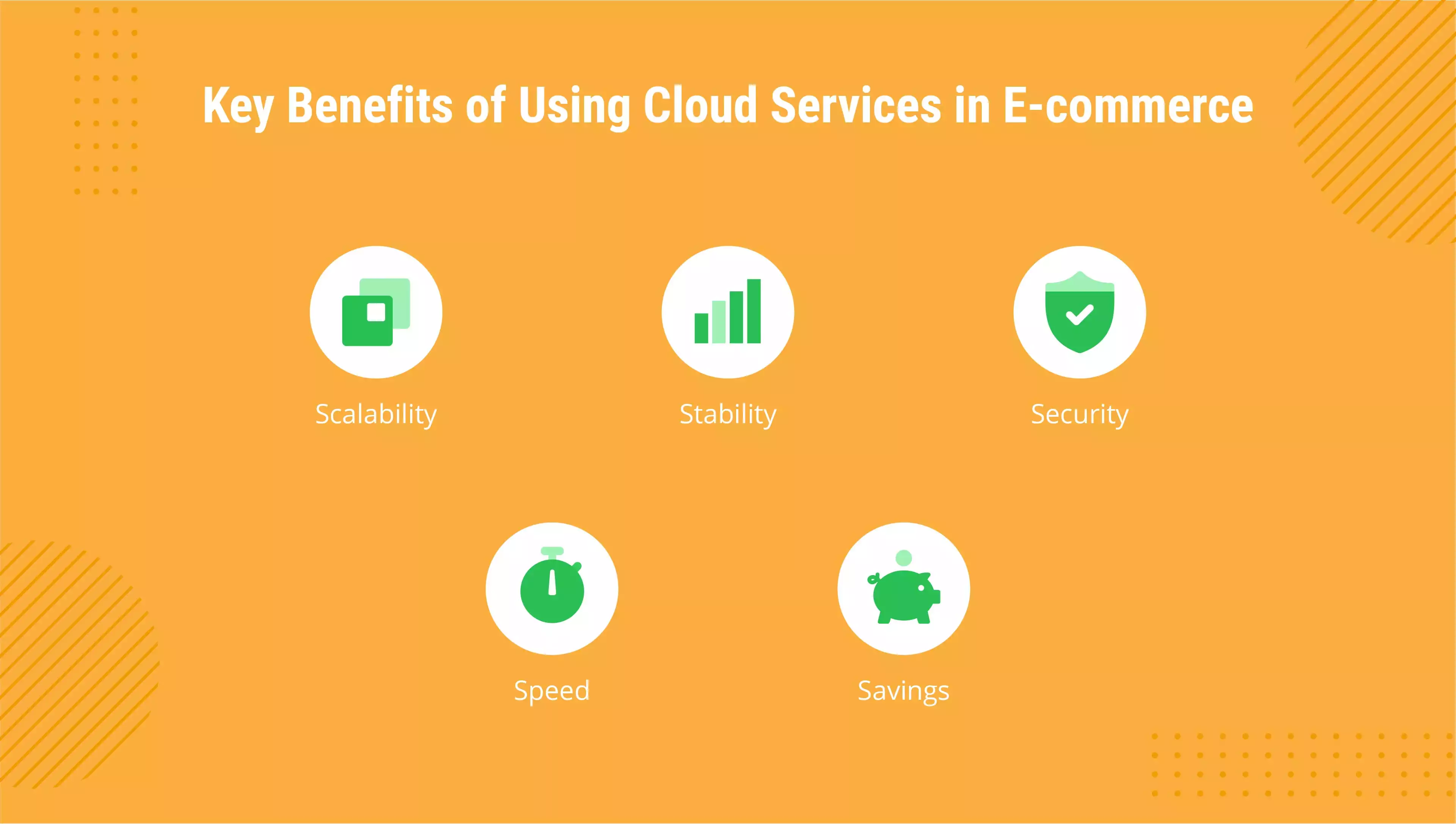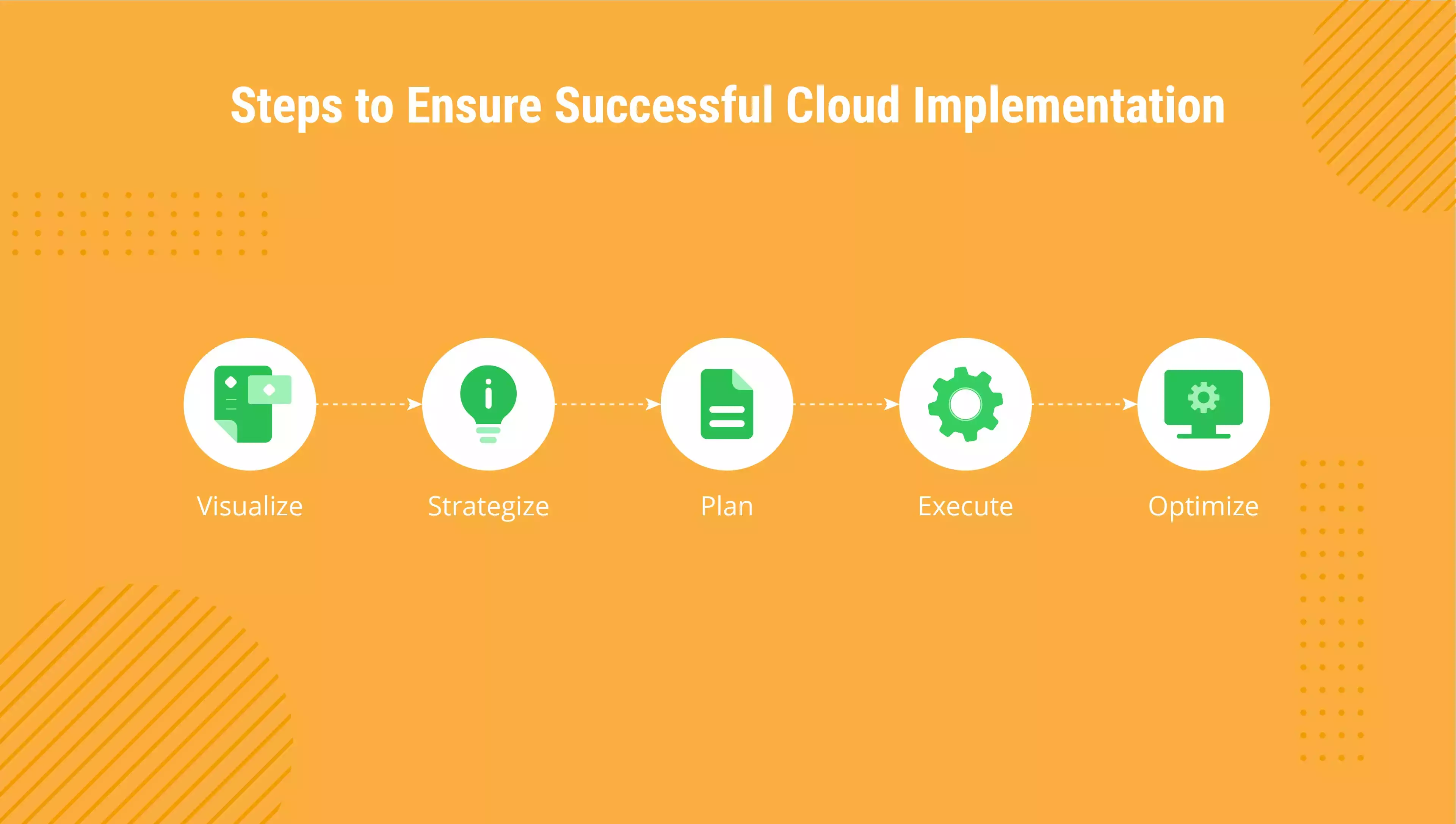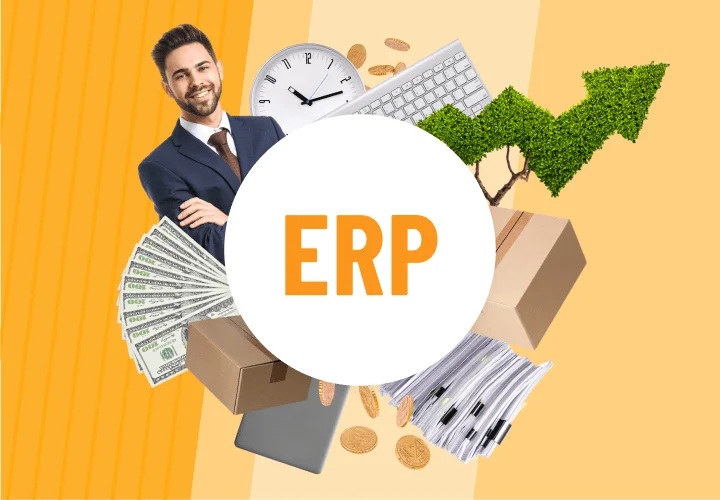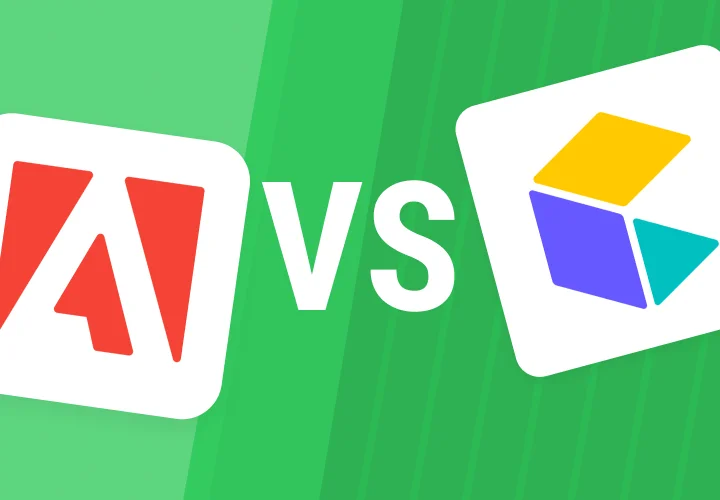Why Move Your E-Commerce Business to the Cloud?
Table of contents
- E-Commerce in the Cloud: Brief Market Overview
- Key Reasons Why Cloud Solutions Are Perfect for E-commerce
- Agility for Research and Development
- Enhanced Market Stability and Resilience
- Unmatched Cost-Efficiency
- Fortified Security
- Superior Adaptability and Scalability
- Optimized Speed and Performance
- High Availability and Global Accessibility
- Streamlined Resource Management
- Rapid Response to New Market Challenges
- Robust Recovery Backups
- Deeper Customer Insights and Personalization
- Significant Revenue Growth
- Accelerated Business Globalization
- Enhanced Collaboration Effectiveness
- Seamless Automatic Updates
- Advanced Infrastructure Support
- Emerging Cloud Trends for E-commerce (2025-2030)
- 5 Steps to Ensure Successful Cloud Implementation
- 1. Visualization
- 2. Strategy
- 3. Planning
- 4. Execution
- 5. Optimization
What are the biggest issues that e-commerce businesses face in 2025? To name just a few, these are fluctuating demand, unpredictable situations on the market, the need for scaling up and down, and performance issues. Also, E-commerce companies need to optimize their spending and gain better insights into their operations. One of the ways to solve these problems is cloud adoption.
In this article, we will gently guide you through all the pros of using cloud computing for E-commerce purposes.
E-Commerce in the Cloud: Brief Market Overview
As Fortune Business Insight states in their report, the global commerce cloud market size was $12.32 billion in 2019 and is projected to reach $55.67 billion by 2027, exhibiting a CAGR of 20.8 % during the forecast period.
According to the Future of Retail 2023 report, the E-commerce market surged almost 34% in 2020 due to the pandemic. However, E-commerce sales are expected to grow by 14% in 2023.
The largest e-commerce markets in the world are China, the US, and Japan. In Europe, the top three countries by the volume of e-commerce sales are the UK, Germany, and France.
Moreover, 47% of retail executives believe that the global pandemic accelerated the cloud adoption process in their companies. Forrester experts believe that the cloud will power the overall recovery of both E-commerce and retail industries.
Key Reasons Why Cloud Solutions Are Perfect for E-commerce
While the cloud itself is not a new concept, some companies are still hesitant about full cloud adoption and its deep integration into their core processes. However, as of 2025, cloud services are not merely a forward-thinking option; they are a fundamental necessity for building resilience, ensuring compliance, and maintaining control in an increasingly complex digital landscape. Here are the precise advantages of E-commerce migration to the cloud, highlighting their profound value for businesses from 2025 to 2030:

But let’s dig deeper into the advantages of the cloud for E-commerce and name them more precisely, so you can clearly see their value.
Agility for Research and Development
Research and development are two strong pillars behind a successful business. An effective research of the latest trends can lead your company to new heights. In the modern era, fashion trends and consumer preferences are changing very rapidly, so it’s essential for E-commerce businesses to understand these changes and produce innovative ideas to satisfy the consumer’s needs. Cloud computing is highly helpful in facilitating effective research and development within the company by providing on-demand access to computational resources for data analysis, prototyping, and experimentation with new technologies like AI and machine learning.
Enhanced Market Stability and Resilience
To survive in intense competition, it’s crucial to be capable of making the right decisions at the right time and establishing robust resource management. By leveraging cloud computing technologies, E-commerce businesses can achieve both goals. Cloud infrastructure offers inherent stability, distributed architecture, and advanced disaster recovery mechanisms, ensuring business continuity even during unpredictable market fluctuations or system outages.
Unmatched Cost-Efficiency
Cost efficiency is arguably the most compelling feature of cloud computing. You can easily occupy the space you require according to the fluctuating demand in the business, moving from a CapEx (capital expenditure) to an OpEx (operational expenditure) model. Setting up and maintaining a separate on-premise data management department can be prohibitively expensive. Cloud computing allows businesses to avoid these expenses by offloading a large portion of data management tasks to the cloud provider. Moreover, as a specialized service provider team organizes and sustains your data, you can easily concentrate your resources on other critical areas of your business growth, such as marketing, product development, or customer experience.
Fortified Security
Cloud-based approaches are known to be very secure and effective. And while the security issue is the major problem faced by the e-commerce industry, cloud technology can be seen as both high-tech and a protected path for data management. Cloud service providers like your fellow Emerline have security experts in their team, who manage the security option in the cloud applications. These professionals are always ready to reinforce your IT department. So the cloud-based technology is more trustworthy for data management than maintaining it yourself.
Superior Adaptability and Scalability
One of the greatest features of cloud computing is its inherent flexibility and scalability. By using this technology, you don’t need to tie up your resources and capital for purchasing and storing a huge amount of physical space for your data. You can easily boost or reduce your computational resources and storage space according to customer demand. For example, during peak shopping seasons like Black Friday or holiday sales, customer demand increases dramatically, and you can instantly scale up resources to cope with high traffic. Conversely, during off-peak periods, you can scale down, optimizing costs. This dynamic adaptability is crucial for e-commerce businesses facing unpredictable demand.
Optimized Speed and Performance
The speed of an E-commerce website or its mobile app profoundly impacts user experience and conversion rates. It’s very difficult and expensive to ensure good performance for a website with millions of users accessing it simultaneously using traditional on-premise infrastructure. With cloud computing, businesses can achieve significant savings while offering fast service to their users. Slow load times and downtime are major issues for e-commerce industries, which can be drastically reduced with the help of cloud-based technology. Cloud solutions upload data to the vendor’s data center in real-time, often leveraging Content Delivery Networks (CDNs) to cache content closer to users globally, ensuring faster load times and seamless navigation.
High Availability and Global Accessibility
In the past, businesses relied on the physical availability of data. However, cloud computing provides virtually unlimited, reliable access to crucial information from anywhere, at any time, with an internet connection. This technology significantly enhances data accessibility and ensures high availability, minimizing downtime. In the modern era, accessing data with a robust internet connection via the cloud is one of the most reliable and efficient options, supporting a truly global operational model.
Streamlined Resource Management
Cloud computing makes resource management incredibly easy and painless. As you are often "outsourcing" this service to a third-party vendor (or utilizing managed services), you don’t need to handle the underlying infrastructure management. A well-prepared team at the cloud provider handles, maintains, and upgrades your data and systems for you, allowing your internal teams to focus on core business functions.
Rapid Response to New Market Challenges
Cloud-based E-commerce applications allow businesses to quickly react to new market challenges and opportunities. By leveraging cloud analytics and data processing capabilities, companies can gain rapid insights into customer reviews, market trends, and competitive landscapes. This agility enables swift adaptation of product offerings, marketing strategies, or operational processes to meet evolving demands.
Robust Recovery Backups
In the E-commerce industry, most activities are based on servers. Interrupting power supply and such unpredictable issues as physical damage in the workplace can lead to data collapse and heavy revenue losses. However, if you are using cloud-based technology, you can relax and free your head from this pain, as all of your data is safe in the cloud, and you can run your business in the usual manner.
Deeper Customer Insights and Personalization
Cloud computing is instrumental in finding and understanding premium customers. By tracking visits to various products, analyzing purchase histories, and leveraging cloud-based Big Data and AI/ML analytics platforms, e-commerce businesses can gain profound insights into customer preferences. This enables the creation of highly personalized offers, targeted marketing campaigns, and dynamic product recommendations, leading to increased customer satisfaction and loyalty.
Significant Revenue Growth
Cloud computing unleashes incredible growth in revenue for companies. Its cost-effectiveness, by eliminating the need for expensive upfront infrastructure investments and offering a pay-as-you-go model, saves businesses a lot of money. There is no need to block excess capital for data maintenance issues; instead, that money can be reinvested into other areas of business growth, such as marketing, product development, or expanding into new markets, ultimately driving increased revenue.
Accelerated Business Globalization
Cloud computing is highly useful for expanding businesses on a global level. By leveraging the internet and globally distributed cloud data centers (regions and availability zones), you can easily target customers worldwide. This provides an effective and comparatively cheap way of business development, as customers from any area of the world can easily access your e-commerce platform with low latency and high performance.
Enhanced Collaboration Effectiveness
Cloud computing allows your business to communicate with your employees across the world. A common data, file, or information can be accessed by various people in different locations at the same time. Also, you can use cloud computing to share the information with your investors, suppliers, advisors, and accountants.
Seamless Automatic Updates
Cloud computing companies consistently integrate the latest technologies and security patches. When your data management and applications reside in the cloud, the underlying system often gets updated automatically, and you don’t have to worry about manual upgrade issues or maintaining complex IT infrastructure. This ensures your E-commerce platform always runs on cutting-edge technology.
Advanced Infrastructure Support
In E-commerce, data analysis plays a crucial role in understanding the customer’s needs. Millions of users search for various items daily, so picking up the trend and interest of the user is a tricky issue. Cloud computing services together with modern data analyzing techniques can easily solve these issues.
Despite having numerous benefits, cloud transformation may be a tricky process. It is essential to have in-depth visibility into cloud use across the organization and provide ongoing oversight. Only then would you be able to manage costs and achieve the full potential. However, beware of adopting the cloud for the sake of tech advancement. By pushing a cloud-first approach without a proper plan and actual need, you can increase costs, diminish value, and end up with an oversized infrastructure. So how do you make the most out of the e-commerce cloud?
Emerging Cloud Trends for E-commerce (2025-2030)
Beyond the foundational benefits, several key trends will shape cloud adoption for e-commerce in the coming years:
- Composable Commerce: E-commerce businesses will increasingly move towards composable architectures, leveraging best-of-breed cloud services (e.g., separate microservices for checkout, catalog, search, CRM) that can be flexibly combined and updated. This provides unparalleled agility and prevents vendor lock-in.
- Serverless Computing: The adoption of serverless architectures will grow, allowing e-commerce platforms to scale instantly and pay only for the compute resources actually consumed, further optimizing costs and handling traffic spikes effortlessly.
- Edge Computing: For real-time applications and localized experiences (e.g., in-store IoT, personalized promotions based on immediate location), Edge Computing will become more prevalent, processing data closer to the user to reduce latency and enhance responsiveness.
- AI/ML Integration: Deep integration of AI and Machine Learning will go beyond basic recommendations. Cloud-based AI services will power advanced demand forecasting, fraud detection, hyper-personalization across all touchpoints, automated customer service, and supply chain optimization.
- FinOps: As cloud spending increases, FinOps (Cloud Financial Operations) will become critical. Businesses will adopt practices and tools to manage and optimize cloud costs effectively, ensuring financial accountability and maximizing ROI.
- Sustainability and Green Cloud: E-commerce companies will increasingly seek cloud providers committed to sustainability, looking for data centers powered by renewable energy and efficient resource utilization to reduce their carbon footprint.
- Data Sovereignty and Compliance: With evolving global data privacy regulations, the ability to ensure data residency and compliance within specific geographical regions will be a key consideration for E-commerce businesses operating internationally. Hybrid and multi-cloud strategies will play a vital role here.
- Low-Code/No-Code Development: The rise of low-code/no-code platforms on the cloud will empower business users to build and customize e-commerce applications and workflows with minimal coding, accelerating time-to-market for new features.
5 Steps to Ensure Successful Cloud Implementation
There are multiple cloud adoption frameworks, and a lot of things depend on the business needs. However, a typical cloud transformation journey can be reduced to five major steps: visualization, strategy, planning, execution, and optimization. Each step is made up of several questions you have to answer to make the best decisions and act accordingly.

1. Visualization
You have to understand where you are and where you want to be: it’s a crucial part of the process.
- What are your primary reasons for considering the cloud?
- Are you looking to unlock new opportunities?
- Do you need more flexibility and scalability?
- What are your current pain points with existing infrastructure?
2. Strategy
In order to execute everything properly, examine your resources, infrastructure, and architecture.
- Evaluate out-of-the-box SaaS solutions.
- Consider IaaS and PaaS options.
- Decide whether you are heading to in-house or outsource development.
- Develop a hybrid or multi-cloud strategy to avoid vendor lock-in and optimize for specific workloads.
3. Planning
Understanding what needs to be done, when, and how, is critical for successful cloud implementation. Make sure to:
- Define the scope of work for each phase of migration or new development.
- Discover cross-system dependencies and integration points (e.g., with ERP, CRM, inventory systems).
- Set clear acceptance criteria for performance, security, and functionality.
- Establish a FinOps framework to plan and monitor cloud costs from the outset.
- Develop a comprehensive cybersecurity plan specific to the cloud environment.
4. Execution
Whether you are setting in infrastructure, moving your application to the cloud, or redeveloping your legacy product, remember:
- Iterate according to the plan using agile methodologies.
- Stick to acceptance criteria and conduct continuous testing.
- Share results with your users to gather feedback and make adjustments if needed.
- Prioritize cloud-native development for new applications to maximize cloud benefits.
- Implement Infrastructure as Code (IaC) for consistent and automated deployments.
5. Optimization
Cloud adoption does not end with the deployment to the cloud, so make sure to:
- Create operational dashboards for real-time monitoring of performance and costs.
- Keep your logs handy for troubleshooting and auditing.
- Continuously monitor and optimize cloud spend (FinOps).
- Keep in mind DevOps services for continuous integration, delivery, and operational excellence.
- Regularly review and update security policies and configurations.
- Leverage cloud provider's managed services for databases, AI/ML, and other specialized needs to reduce operational burden.
Here at Emerline, we help clients develop the best cloud strategy for their business case, create a roadmap, and develop a solution that best fits their business needs. Having rich expertise with various cloud solutions, whether it’s the Amazon Cloud, SaaS, Google Cloud, and others, we are capable of finding the right technology for your business and implementing it with professionalism, in a fault-free manner. Whether they need cloud readiness assessment or infrastructure setup, architecture redesign, migration, and maintenance, we are here to help at every step of the way.
Updated on Jul 10, 2025





